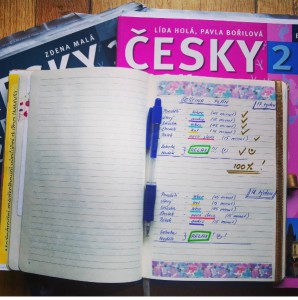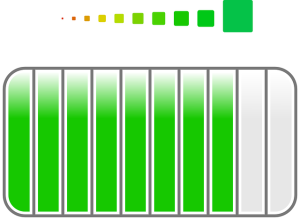What do you need for a learning Czech or generally for a good and successful language learning? Our manager and teacher Alena Kamenová says: „From my point of view of Czech language teacher there are two things: commitment to it and positive attitude.“.
You may think that might be easy to say. So let’s see what does she mean in particular.
Commitment to it
She explains: „With commitment I mean your goal, your motivation. Why do you want to learn that language? What do you want to able to use it for? Do you want to be able to work and live in Czech Republic? To understand your love ones – partner and his/her family, your own child? Do you want to be able to read books? Listen to the Czech music? Or do you want to learn an lovely exotic language? Any reason is good! When you know your motivation you are on a right track.“
Now how can you benefit from it? Set your primary goal and then set your progressive goals. For example: I want to learn the language to be able to understand and talk to my partner and his/her family when we visit them. That’s your main goal. Then set your progressive goals, for example: when do you want to be able to do it like „In a year I want to be able to talk to them about my interests, hobbies, family, weather. I want to know how to ask them how they are doing, what do they like, where they have been.“. If you choose to study with a teacher he or she should help you to set these progressives goals because he/she is a professional who should know how much time is approximately needed.
Good. So that’s your goal. Now what? Positive attitude she says, hmm…
Positive attitude
Now you might be saying to yourself: So, should I be smiling while studying or what? … Alena replies: „Yes, you can but that’s not what I mean. Positive attitude for me means a complex of few things which create it.“. Let’s take a look:
1) take small steps
You need to avoid the disappointment. Studying language is a run for a long track. You need to know that the progress could be slow sometimes. That’s normal and honestly sometimes is better to be slow and precise than hurry and learn things incorectly or forget it later because you haven’t strengthen it enough. Practise makes master and small continuing steps are best for practising

2) study regularly and reasonably
Together with small steps the continuance is the most crucial. You should set your timetable of regular lessons (your owns and/or with a good teacher), hold on to it and thanks to it create a habbit. It all soon become much more easier with a good habbit (and don’t worry, holidays and vacations are allowed!).
The main rule with creating a good schedule is don’t overload yourself. Very often mistake beginners make is to jump into studying because Oh my Gooood, it’s awesome language and I want to learn it right now!!! Alena says: „I also have done this mistake and I can tell you that after some time of studying every day for many hours I eventually lost my motivation, my drive, I eased up a lot and I even stopped for few weeks.“.
So what is the best way to do it? How to avoid this scenario? Alena advices: „set yourself some reasonable timetable„. You can study two-three times a week without any time limitation or you can set that you want to learn the language every day for 15-20 minutes etc. If you are studying on your own keep on mind that you need to practise all four competences: reading, writing, listening and speaking. And of course you need to acquire grammatical rules and gain a new vocabulary. So how could your schedule look like? You can look at the picture here where there are two times a week standard lessons (45 or 60 minutes) and for three other days there are small blocks of single activities (15-20 minutes). These small blocks could represent repeating vocabulary in the bus, listening Czech radio/audio, reading short Czech news in the bathroom (yes, some of us reads there so why not use it for this 🙂 ) etc. You know yourself and your schedule the best so choose what suits you and your goal best but remember to do it regularly a in terms of time reasonably. That’s the way to setting a good habbit!

3) see your progress
Alena says: „Good teacher should help you to see your progress because our job is not only to teach you the language and the culture etc. but also to motivate you, support you. And in this support has showing you how well are you doing and improving it’s place.“ All this propper and necessary feedback will refresh your motivation and bring you new one and with all this enthusiasm you are going to continue easier. And yes, then you are going to be smiling during your lessons 🙂

So let’s sum this up – how can you success in language learning? Set your primary goal: why do you want to learn that language; and then set your progressive goals: what do you want to know and be able to say in six months/in one year etc. Along with this cherish your positive attitude which means to study regularly and in terms of time reasonably: do small steps but do them all the time, don’t stop. And finally let your progress help you: take a look at what you have already achieved at let it boost you.
And if you are not sure you can do all this by yourself, think that’s too much things to do we can help you. Because no one said you must be alone in this!








